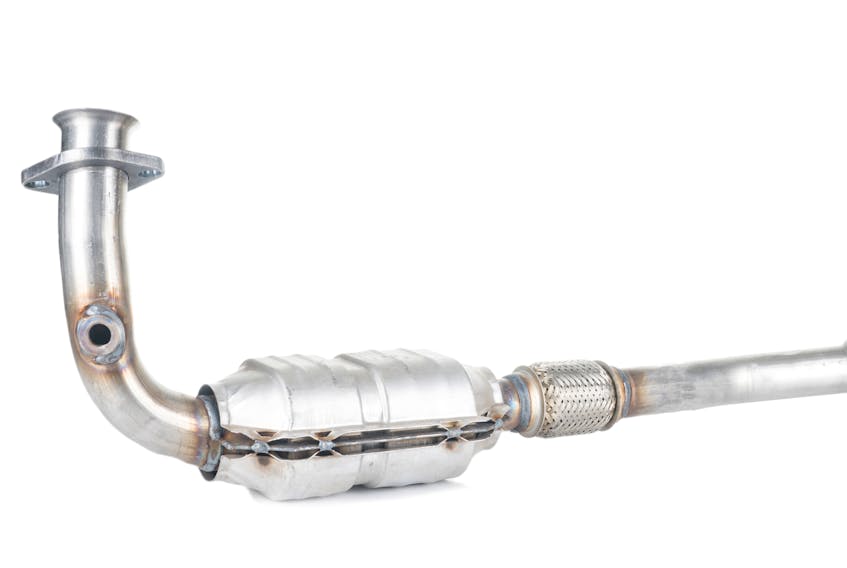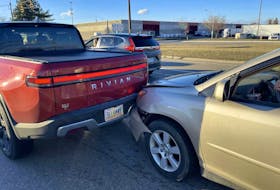You’ve probably noticed an increasing number of headlines about the theft of catalytic converters. It’s a worsening problem not just across Canada, but the rest of the world, too.
We’ve entered a perfect storm of conditions that means bad news for car owners, insurers, and law enforcement. The RCMP in P.E.I. recently seized $100,000 worth of the purloined parts and laid 41 charges.
While that was a larger-scale operation, the cut-and-grab of this part of your exhaust system is lucrative for smaller-scale thieves, as well.
A catalytic converter, a part of every car’s exhaust system since 1993, receives pollutants from the car’s engine, and breaks them down to their molecular level components so they can then be released back into the environment, in a far cleaner form than what is created when your engine produces power from gasoline or diesel fuel. It’s essentially a box that speeds up a chemical reaction.

The reason it is so attractive to thieves is the precious metals that are used to make it work. Platinum, rhodium, and palladium are bought and sold like gold and copper. Palladium is currently more expensive than gold, and rhodium is more than four times more valuable than gold — it was trading around US$8,000 an ounce in 2020. Coinciding with a global pandemic, lost jobs have led to bolder – and more frequent – thefts. Even our preference for larger, higher vehicles has made it easier, since while lower-profile vehicles must be jacked up to get at the converter, adding precious minutes to a fast-paced rip-off, thieves can just slide under many larger vehicles.
Unlike owners of the higher-end cars and SUVs that are targeted to be resold overseas after they’re stolen, nearly all of us are at risk of having this part stolen from our vehicles. Hybrids are especially vulnerable; they have a higher concentration of the high-value metals, and generally less corrosion.
“When the price of those precious metals shot up, so did the thefts,” said Bryan Gast, National Director of Investigative Services with the Insurance Bureau Canada (IBC). “It’s a huge problem.” IBC is working with law enforcement to better track the end-users as well as thieves.
Alberta has introduced a bill that will try to shut down the relative ease with which thieves are able to sell to scrap yards. Last year, a 24-year-old man in that province was caught with 462 stolen converters; he’d had a B team of people stealing them for him, and he, in turn, was anticipating a $300,000 payday when he sold them to scrappers. Police intervened.

In the United Kingdom, they’re trying to throttle illegal pipelines with the Scrap Metal Dealers Act, forbidding cash sales and tracking identity checks on sellers. The Alberta Bill 25 is very similar. Establishing a chain of provenance for the parts would reduce the ability of thieves to sell stolen goods.
The news for car owners is still bad. Replacing a stolen catalytic converter is, on average, about $2,000. If you discover yours has been hacked off in the night (it takes about two minutes with a Sawzall to remove it) you’re faced with making an insurance claim under your comprehensive coverage. Just like when you get your windshield dinged, you have to weigh the value of paying out your deductible (average is $1,000) and risk your rates heading up.
Cats are the new windshields, where we get to wonder why we have insurance we’re too scared to use. The rise in thefts means shortages from OEMs for replacements, as the vicious circle continues. You can’t drive without one (and your ears will tell you immediately) and supply shortages may mean an increased wait time — or your car may also sustain enough damage to need more extensive repair.
What car owners can do is make their car less of a target. Reg Phillips is the CEO of Vehicle Road Safety Solutions (VRSS), a U.K. company importing a process that is simple, inexpensive, and effective — for about $30, you get from them an identification number embedded on a piece of tape. Adhere that to your catalytic converter (or have your technician do it when you’re in the shop), swab a chemical over it, and that number is now etched on the part. There is a central database app that can now track that converter to your vehicle.
Law enforcement has hit a stumbling block because they often can’t track the stolen parts to individual vehicles; this new technique allows them to connect the theft to a crime. You also get two stickers for your car’s windows that warn thieves the converter is traceable. Will it stop all of them? Nope, but it will sure make your car a far less attractive target.
If you have a garage, park your car in it. Park in well-lit areas, and if possible next to a fence or wall. Thieves have to jack your car up from the side to access the catalytic converter. A theft can take as little as two minutes; while some thieves will unbolt the converter, others will just saw it off. Some owners are getting their mechanics to weld the bolts that hold the converters in place to the frame, so they can’t be easily removed. If you see someone under a car they don’t own, call the police. Some places in the U.S. are holding etching days, where techs hand etch a car’s licence plate number onto the converter.
Or you can drive an electric car, which doesn’t have a catalytic converter at all.









